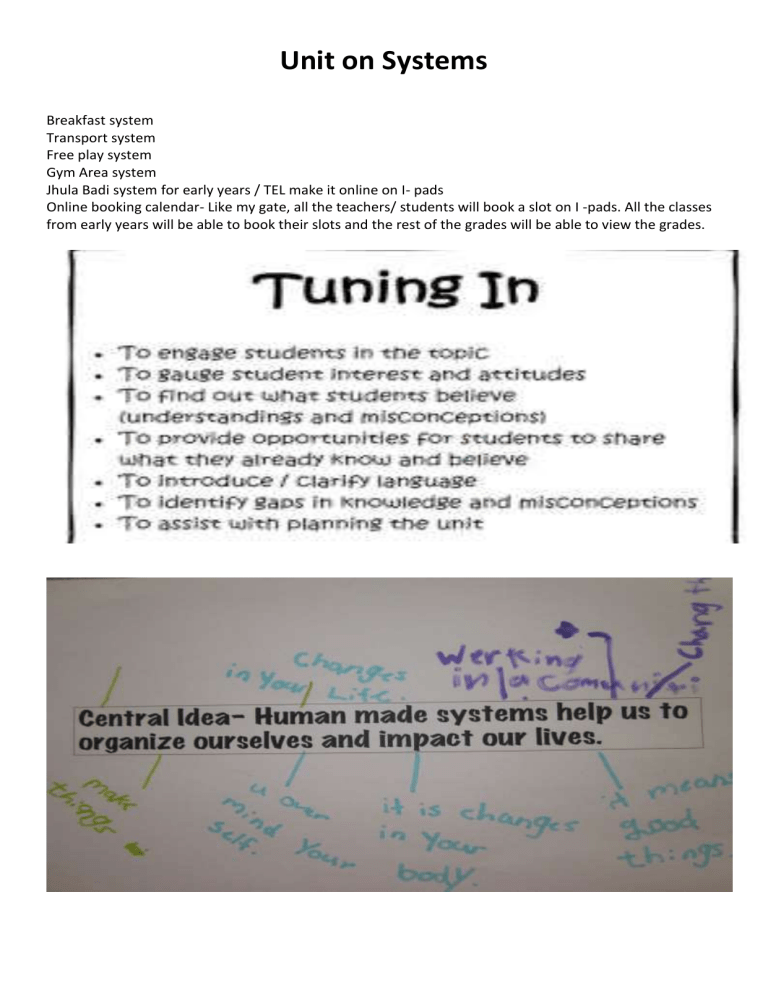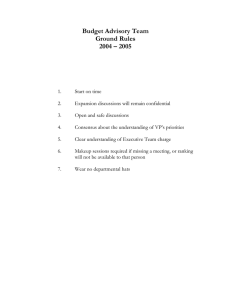
Unit on Systems Breakfast system Transport system Free play system Gym Area system Jhula Badi system for early years / TEL make it online on I- pads Online booking calendar- Like my gate, all the teachers/ students will book a slot on I -pads. All the classes from early years will be able to book their slots and the rest of the grades will be able to view the grades. https://www.youtube.com/watch?v=GccpugKMfiw entral Idea: Different systems help us organize ourselves, our families, and our communities, and each of us has roles and responsibilities within these systems. Transdisciplinary Theme: How We Organize Ourselves Subject(s): Social Studies, Language, Mathematics, Arts, Personal, Social and Physical Education (PSPE) Duration: Approximately 4-6 weeks Key Concepts: Form, Function, Responsibility Lines of Inquiry: 1. Understanding different organizational systems in our lives (e.g., family, school, community) 2. Exploring the roles and responsibilities within these systems 3. Investigating how systems help us live and work together Knowledge and Skills: Identify and describe different organizational systems (e.g., family, school, community) Recognize and discuss roles and responsibilities within these systems Participate in group activities and discussions related to organizational systems Demonstrate basic understanding of numbers and counting related to organizational systems Use simple vocabulary and language to discuss roles and responsibilities Attitudes: Cooperation: Working collaboratively with peers in group activities and discussions Responsibility: Understanding and fulfilling roles and responsibilities within different systems Respect: Valuing the contributions of others within organizational systems Appreciation: Recognizing the importance of organizational systems in our lives Approaches to Learning: Social Skills: Collaborating, sharing, and taking turns during group activities Communication Skills: Expressing ideas and thoughts related to organizational systems using age-appropriate language Thinking Skills: Observing, comparing, and categorizing different roles and responsibilities Self-Management Skills: Demonstrating independence and responsibility in completing assigned tasks Assessment: Formative Assessment: Teacher observations during group discussions and hands-on activities Summative Assessment: Students' creations or presentations showcasing their understanding of a specific organizational system and their roles and responsibilities within it Learning Experiences: 1. Introduction to Organizational Systems: Group discussions and brainstorming about different organizational systems (e.g., family, school, community) Sharing personal experiences and stories related to different systems Exploring Roles and Responsibilities: Role-playing and dramatic play activities to understand different roles within systems (e.g., pretending to be a family member, teacher, or community helper) Creating visuals or charts to represent roles and responsibilities within specific systems Investigating Community Systems: Field trips or virtual experiences to explore systems in the local community (e.g., visiting a fire station, interviewing a community helper) Group discussions and sharing about the roles and responsibilities of community members Numbers and Counting in Organizational Systems: Math activities incorporating numbers and counting related to organizational systems (e.g., counting family members, counting students in the class) Creating simple graphs or charts to represent data related to organizational systems Reflection and Celebration: Sharing and discussing the knowledge gained about organizational systems through presentations, displays, or storytelling Reflecting on the importance of roles and responsibilities within different systems and how they contribute to a functioning community 2. 3. 4. 5. Title: Exploring Systems: Interconnections and Interactions Central Idea: Systems exist in various aspects of our world, and their components and interactions impact the functioning and balance of the whole. Transdisciplinary Theme: How the World Works Subject(s): Science, Social Studies, Mathematics, Language Grade Level: Grade 4 Duration: Approximately 6 weeks Key Concepts: Form, Function, Connection Lines of Inquiry: 1. The definition and characteristics of systems 2. The components and interconnections within systems 3. The impact of changes in systems Knowledge and Skills: Define and identify different types of systems Observe and analyze the components of various systems Understand the interdependencies and interactions within systems Investigate cause and effect relationships in systems Apply systems thinking to real-life situations Attitudes: Appreciation: Recognizing the complexity and interconnectedness of systems Curiosity: Developing an inquisitive mindset to explore systems Cooperation: Collaborating effectively to understand and analyze systems Responsibility: Acknowledging the impact of individual actions on systems Approaches to Learning: Research Skills: Conducting investigations and gathering information about systems Thinking Skills: Analyzing and evaluating the components and interactions within systems Communication Skills: Presenting findings and explanations related to systems Social Skills: Collaborating and engaging in discussions about systems Assessment: Formative Assessment: Observations, discussions, and reflections throughout the unit Summative Assessment: Presentation or report showcasing the understanding of a particular system and its components, interactions, and interdependencies Learning Experiences: 1. Introduction to Systems: Class discussions and brainstorming about different types of systems Reading and analyzing books or articles on systems Exploring Systems: Hands-on activities to investigate various systems (e.g., water cycle, food chain, transportation) Observing and mapping components and interconnections within systems Cause and Effect in Systems: Conducting experiments to explore cause and effect relationships within systems Reflecting on how changes in one component affect the entire system Real-Life Application of Systems Thinking: Field trips or guest speakers to explore systems in the local community (e.g., waste management system, public transportation system) Analyzing real-world scenarios and discussing the impact of systems on daily life Synthesis and Reflection: 2. 3. 4. 5. Collaborative projects or presentations demonstrating understanding of a chosen system Reflecting on the significance of systems thinking and its application in various contexts Note: This is a simplified example, and the unit planner can be further developed with specific learning outcomes, teaching strategies, and resources tailored to the needs and requirements of the Grade 4 class at the Deutsche Schule London.

